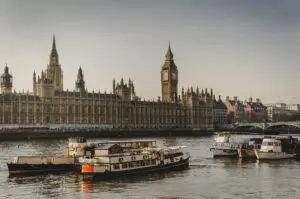With Labour looking closer to power than it has been since 2010, the Party was emboldened and Conference was busy. Below Brevia has summarised the key takeaways and policy developments from Labour Party Conference 2023.
A HEAVY EMPHASIS ON WINNING AND ACUTELY AWARE OF THE MESS THEY MIGHT INHERIT
Keir Starmer gave arguably his best speech to date summing up the Party’s change in direction under his leadership as ‘protest or power?’. Completely alive to the state of the country’s finances, public services and infrastructure, Starmer and his Shadow Cabinet have started to pitch the need for a ‘decade of national renewal’ to repair the damage. However, the Labour hierarchy are conscious there is a long way to go, 120 gains are needed to win a majority of just one, and the Tory campaign machine will grind into gear. Policy will be ‘bomb-proofed’[1] before it makes the manifesto and frontbenchers, MPs and prospective candidates demonstrated unity and discipline whether in fringe meetings or receptions.
BOLD POLICY VISIONS THAT STARMER WILL HAVE THE FINAL SAY ON
Labour’s current poll lead afforded its spokespeople the political space to announce bold visions on NHS reform, growth and jobs, and fiscal responsibility. Both Starmer and Shadow Net Zero Secretary, Ed Miliband, seemed happy to counter Sunak’s weaponisation of net zero a few weeks prior[2] insisting the UK should act more quickly on climate change to benefit from the security, jobs and lower bills green policies can provide.[3] Conference motions play an important role in Labour’s policy formulation process but there was little dissent and Starmer will be able to determine the manifesto largely as he wishes. For example, after the trade unions won a vote on nationalising energy, Shadow Business Secretary Jonathan Reynolds swiftly declared ‘we’re not going to nationalise the energy system’. [4] Key Labour policy pledges included:
Tax
- Guaranteeing in law that ‘significant and permanent’ tax and spending changes will be subject to an independent forecast from the Office for Budget Responsibility (OBR).
- Abolish the ‘non-dom’ tax status.
- End the tax loophole which exempts private schools from VAT.
Energy
- An Energy Independence Act.
- GB Energy to work in coordination with transmission operators to remove barriers and facilitate grid upgrades.
- 100 per cent clean power by 2030.
Health
- An extra £1.1 billion to provide NHS staff overtime to work evening and weekend shifts to deliver an extra 2 million operations in the first year to reduce hospital waiting lists.
- A new £171 million annual ‘Fit for the Future Fund’ to replace outdated NHS equipment such as CT and MRI scanners.
- Funding for NHS dentists to offer 700,000 more urgent appointments and incentivise dentists to work in the most in-need areas.
- Reform to move from hospital to community, analogue to digital and sickness to prevention.
Transport
- Giving local areas in England the power to take back control of privatised bus services and lifting the ban on municipal ownership.
- Launch an independent review into the failures of HS2.
- Transport infrastructure investment including Northern Powerhouse Rail, within Labour’s fiscal rules.
- Bringing rail franchises back into public ownership.
Housing
- 5 million new homes over the course of the next parliament with majors handed greater housing and planning powers.
- New towns next to existing rail connections.
- Making the Affordable Housing Programme more flexible to deliver the biggest boost to affordable housing for a generation.
R&D and Investment
- 10-year research and development funding settlements to support innovation.
- A pledge to raise business investment as a share of economic output to 11 per cent, up from 10 per cent.
- Creation of a National Wealth Fund to leverage private investment.
- A new ‘Auto Strategy’ with fast-track planning processes for priority areas such as batter factories and 5G infrastructure.
- Establish a cross-departmental Infrastructure Acceleration Unit.
Other
- Empower the water regulator, Ofwat, to ban the payment of bonuses to water bosses who are found to pump significant levels of raw sewage into rivers, lakes and seas.
- A Community Policing Guarantee promising increased patrols and 13,000 more neighbourhood policy.
- A revamped apprenticeship levy to fund specialist training colleges that equip works for local industries, particularly in renewables.
- A review of early years childcare provision.
BUSINESS KEPT CONFERENCE BUSTLING; STARMER’S TEAM REMAIN FOCUSED
Last year, I wrote about the ‘belief and optimism’ among Shadow Ministers and Labour activists that they could win the next general election. Plainly, businesses now share this confidence. This was a busy conference with a hugely increased attendance of businesses and external groups. The Party reportedly broke records for pass sales and more than doubled sign-ups for its Business Day costing £2,250 a ticket.[5] But whilst many business executives have assessed the polls and decided it is a foregone conclusion, Starmer’s team continue to underline they take nothing for granted.
BREVIA CONSULTING PROVIDES STRAIGHTFORWARD POLITICAL ADVICE AND SUPPORT TO BUSINESSES AND ORGANISATIONS
Discover how Brevia can help you and your organisation by contacting the Brevia Team on 020 7091 1650 or contact@brevia.co.uk
[1] The Guardian, 7 October 2023, link
[2] Prime Minister’s Office, PM Speech on Net Zero, 20 September 2023, link
[3] The Labour Party, Ed Miliband’s speech at Labour Conference, 9 October 2023, link






